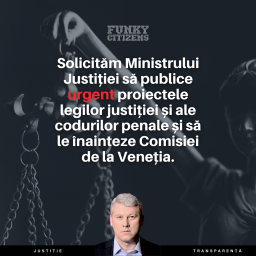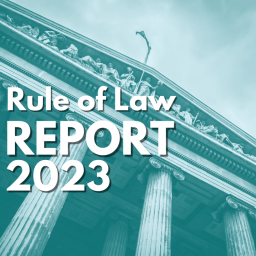Funky Citizens currently implements several projects with a direct focus on the benchmarks of the Cooperation and Verification Mechanism. These talking points were prepared with a view of the monitoring visit of the European Commission delegation to Romania and are based on the lessons learnt in our activities.
Challenges & recommendations
The main challenges related to the next 14 months are, in our view, mostly related to:
I. Romania faces 3 different rounds of elections in 2016, as well as the nomination procedure for heads of 3 crucial institutions in the justice system:
- for the local and parliamentary elections of June and November 2016, respectively, the new legislation concerning political parties and electoral campaigns will need special monitoring; just as well, the procurement of ballots and other materials needed for the proper organization of these rounds of elections. Possibly, correspondence voting will also be adopted this November, and will be available for the first time in the parliamentary elections of 2016;
- for the CSM elections of September (?) 2016, magistrates and civil society will pay attention to the voting procedures in the elective assemblies of judges and prosecutors. The electoral campaign and the voting process for the magistrates’ elections should benefit from civil society monitoring/scrutiny. The professional organizations of magistrates have yet to provide a profile for the ideal candidate, lest the elections will be another shot in the dark.
- the recently finalized nomination procedure for DIICOT reinforces the idea that Romania needs more transparency on behalf of candidacies for the top prosecutorial positions. In the second half of 2016, the mandates of the General Prosecutor and the Chief Prosecutor at DNA will come to an end, so appointments for these positions must be monitored closely, unless the entire procedure is reformed. Just as well, the mandate of the Chief of the Supreme Court ICCJ will come to an end, and the procedure there is quite different—CSM needs to ensure the transparency of both candidacies and the process.
II. Public spending remains one of the most important challenges for Romania, and the occurrence of corruption both at national and local level shows that a special attention should be paid to:
- the public funds allocation during for the rest of 2015 and all over 2016. The last years have shown that immediately before and during elections periods there is a risk of discretionary allocations from public funds (especially through the reserve fund of the government, through emergency ordinances). The public finance legislation should be fully implemented and the transparency requirements followed closely (public debate for at least 15 days for the national budget and the local budgets).
- the new public procurement legislation and the public finance legislation. More transparency should be the focus for the next year, especially before elections. Open contracting can be a solution for making public procurement more transparent and open and it is also a priority of Romania within the National Action Plan for the Open Government Partnership. The public finance legislation should benefit from better enforcement, especially at local level, where budgets are rarely published and almost never go under the public scrutiny through public debates.
- the conflicts of interest legislation should be widened towards identifying the potential corruption related to honorary public functions and/or beneficial ownership in public procurement. There are increasing arguments for having a closer look at this type of collaboration between various officials and counsellors, especially given the risk of conflicts of interest in the awarding of public contracts and/or State Owned Enterprise management.
III. Anticorruption & transparency legislation
- several bills pending in Parliament might bring significant changes to the anticorruption and transparency laws. Special attention should be paid to procedural issues concerning these proposals: aside from careful examination on behalf of the judiciary and civil society, legislative proposals should benefit from a more effective enforcement of the transparency/public consultation and legislative technique requirements (cost-benefit analyses, regulatory impact assessments, impact studies, etc.).
- a more effective enforcement of the preventive measures related to transparency of decision-making (Law 52/2003) or budget transparency (Laws 500/2002 and 273/2006) is essential for identifying and preventing potential corruption cases before they harm the public resources and lead to criminal offences.
Developments in the last year
Since the last monitoring visit, the developments we have noticed in the implementation of our projects and in our advocacy actions are mostly related to:
Benchmark 1: Ensure a more transparent and efficient judicial process notably by enhancing the capacity and accountability of the Superior Council of Magistracy. Report and monitor the impact of the new civil and penal procedures codes
- The National Strategy for the Development of the Judiciary 2015-2020 was adopted and published in the Official Journal in January 2015. The Ministry of Justice organized a public debate on the document, and Funky Citizens, Expert Forum and LiderJust sent a joint set of suggestions that were included in the final version (http://www.funkycitizens.org/wp-content/uploads/2014/12/Comentarii-Strategia-de-dezvoltare-a-sistemului-judiciar-2015-2020.pdf). While the work on an Action Plan for implementing the Strategy was expected to start in February, nothing happened so far.
- Funky Citizens launched in September 2014 the first edition of the Courts Performance Index (http://onoratainstanta.ro/pages/indicele-de-performanta) which assesses the performance of courts on the basis of official data provided by portal.just.ro. The next edition will be launched on 7 October 2015 and will include a similar assessment for the Prosecutor’s Offices. During the research and data gathering phase, we noticed discrepancies between the openness levels of various Prosecutor’s Offices. While most of them learned to communicate with representatives of civil society, some institutions are still reluctant with respect to transparency.
- After the huge corruption scandal generated by the allegations brought to the former Chief Prosecutor of DIICOT, no improvement was seen in the nomination of the successor in office. This shows that Romania still fails to adopt a transparent and objective method for nominating the Chief Prosecutors. A similar concern exists about the nomination of the President at the Supreme Court (ICCJ).
- The Superior Council of Magistracy is currently working on a draft proposal amending Law 303/2004 on the statute of judges and prosecutors. In August, CSM decided to consult the general assemblies of magistrates on the proposals. The draft of the proposals is not available for the general public, and over 1300 magistrates already signed a protest document against the changes in the evaluation and promotion of magistrates.
Benchmark 2: Establish, as foreseen, an integrity agency with responsibilities for verifying assets, incompatibilities and potential conflicts of interest, and for issuing mandatory decisions on the basis of which dissuasive sanctions can be taken
- Appointments to the National Integrity Council (CNI) were completed after a long and bumpy process. Not all the seats of the Council are occupied, mainly because of the groups that decided not to make nominations. However, the Council has a sufficient number of members to conduct its activity.
- After the President of the National Integrity Agency resigned on corruption allegations, the CNI started the process for recruiting a new President. All three candidates failed on the written examination, which means that the procedure will have to start over again. Notice that this is the 6th time when this process fails during ANI’s existence, begging the question on the effectiveness of the entire regulation regarding the selection and appointment of ANI’s President and the Vice-president.
- ANI started verifying the assets of Mr. Mazăre and Mr. Oprescu, mayors of two major cities (Constanța and Bucharest, respectively), only after the National Anticorruption Directorate (DNA) started prosecuting them. ANI discovered that Mr. Mazăre had failed to declare almost 800,000 USD from his accounts. This raises serious concerns on ANI’s priorities concerning investigations, especially in regards to the upcoming local elections of June 2016.
- The PREVENT project, supposed to act as an early warning mechanism for conflicts of interests in public procurement under EU-funded projects, is not yet functional. Some, but not all, delays were generated by the new public procurement legislation.
Benchmark 3: Building on progress already made, continue to conduct professional, non- partisan investigations into allegations of high- level corruption
- Funky Citizens launched MariCorupti.ro, a website which aims to make an inventory of grand corruption—public officials sentenced for acts of corruption—as well as educate citizens on anticorruption. The website only handles individuals irrevocably sentenced for corruption, offering a summary of their file and essential data on their crime; in addition, users/visitorsmay learn information about anticorruption and the legal definition of each act of corruption. Along with the website, we launched a game of collectibles: stickers with politicians convicted for corruption, aiming to educate and reach out to a broader citizen engagement towards zero tolerance for corruption.
- There is an increasing public interest with regards to the activities of the DNA and the high-level corruption investigations. However, the objective sources of information for the general public with regards to the organization and procedures followed by the judiciary in corruption cases are scarce. This leads to two very different reactions amongst citizens: either the perception that some cases are political retaliations (a reaction provoked and/or nurtured by some biased mass-media channels) or the perception that DNA can solve anything (which leads to distrust in other institutions and increased appeal to the prosecutors even for cases which are not in their competence). We are currently making efforts to educate the general public through a series of infographics (http://www.funkycitizens.org/pachetul-de-infografice-civice) but more efforts should be made in this regard.
Benchmark 4: Take further measures to prevent and fight against corruption, in particular within the local government
- We have continued to work in the area of local budgets – this year we covered and analyzed the budgets of three major municipalities (Bucharest, Iasi, Cluj Napoca), and once again noticed a major challenge when it comes to transparency of public spending. On Bucharest’s budget (the biggest one in Romania, approximately 1 billion euros), scrutinized for the third consecutive year, our analysis raised serious concerns with regards to the budgeting process and the allocation of public funds. The case brought by DNA against the mayor of Bucharest shows that the issues raised by our analysis could be the result of corruption (the analysis can be accessed in Romanian at https://banipierduti.ro/wp-content/uploads/2015/04/Analiza-buget-Bucuresti-2015_1.04.pdf).
- Funky Citizens continued to participate in the monitoring visits conducted for evaluating the implementation of the National Anticorruption Strategy (SNA). During the visits, we noted that many of the local and central institutions of the public administration still fail to implement the provisions of the Strategy, especially the preventive measures. From this point of view, we salute the Ministry of Justice’s intention to extend the time-frame of the SNA for another two years, and we contribute to the definition of the new objectives, under the extended action plan.
- The Operational Program Administrative Capacity provides several EU-funding priorities related to justice reform and anticorruption actions. The implementation of the program should ensure maximum efficiency for the EU funds and should take into account the strategies and priorities underlined by the SNA and CVM reports.
- We have continued to participate to the civil society cooperation platform for the implementation of Open Government Partnership in Romania. Experience so far shows that, in spite of significant progress on OGP at central level, there are severe transparency issues at the level of local administration. The OGP should be promoted more effectively, since it is a valuable tool for preventing corruption through transparency.










[…] pus de niște „talking points” pe MCV, cu ocazia vizitei unei delegații a Comisiei […]
[…] elemente pe care am tot insistat. Principalele noastre observații din cadrul întâlnirilor pot fi consultate aici. De asemenea, ne bucură să vedem că Indicele de performanță al instanțelor 2015, realizat în […]